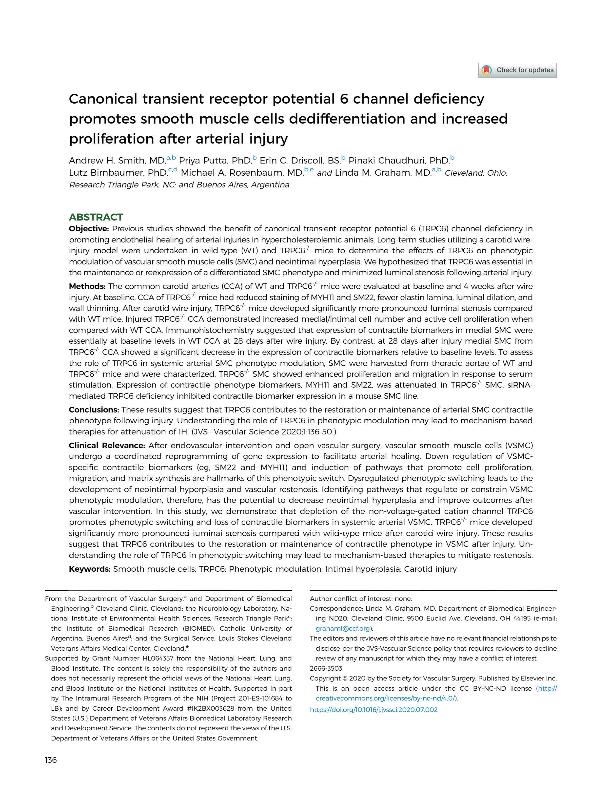Artículo
Canonical transient receptor potential 6 channel deficiency promotes smooth muscle cells dedifferentiation and increased proliferation after arterial injury
Smith, Andrew H.; Priya, Bhanu Priya; Driscoll, Erin C.; Chaudhuri, Pinaki; Birnbaumer, Lutz ; Rosenbaum, Michael A.; Graham, Linda M.
; Rosenbaum, Michael A.; Graham, Linda M.
 ; Rosenbaum, Michael A.; Graham, Linda M.
; Rosenbaum, Michael A.; Graham, Linda M.
Fecha de publicación:
07/2020
Editorial:
Elsevier
Revista:
Vascular Science
ISSN:
2666-3503
Idioma:
Inglés
Tipo de recurso:
Artículo publicado
Clasificación temática:
Resumen
Objective Previous studies showed the benefit of canonical transient receptor potential 6 (TRPC6) channel deficiency in promoting endothelial healing of arterial injuries in hypercholesterolemic animals. Long-term studies utilizing a carotid wire-injury model were undertaken in wild-type (WT) and TRPC6-/- mice to determine the effects of TRPC6 on phenotypic modulation of vascular smooth muscle cells (SMC) and neointimal hyperplasia. We hypothesized that TRPC6 was essential in the maintenance or reexpression of a differentiated SMC phenotype and minimized luminal stenosis following arterial injury. Methods The common carotid arteries (CCA) of WT and TRPC6-/- mice were evaluated at baseline and 4 weeks after wire injury. At baseline, CCA of TRPC6-/- mice had reduced staining of MYH11 and SM22, fewer elastin lamina, luminal dilation, and wall thinning. After carotid wire injury, TRPC6-/- mice developed significantly more pronounced luminal stenosis compared with WT mice. Injured TRPC6-/- CCA demonstrated increased medial/intimal cell number and active cell proliferation when compared with WT CCA. Immunohistochemistry suggested that expression of contractile biomarkers in medial SMC were essentially at baseline levels in WT CCA at 28 days after wire injury. By contrast, at 28 days after injury medial SMC from TRPC6-/- CCA showed a significant decrease in the expression of contractile biomarkers relative to baseline levels. To assess the role of TRPC6 in systemic arterial SMC phenotype modulation, SMC were harvested from thoracic aortae of WT and TRPC6-/- mice and were characterized. TRPC6-/- SMC showed enhanced proliferation and migration in response to serum stimulation. Expression of contractile phenotype biomarkers, MYH11 and SM22, was attenuated in TRPC6-/- SMC. siRNA-mediated TRPC6 deficiency inhibited contractile biomarker expression in a mouse SMC line. Conclusions These results suggest that TRPC6 contributes to the restoration or maintenance of arterial SMC contractile phenotype following injury. Understanding the role of TRPC6 in phenotypic modulation may lead to mechanism-based therapies for attenuation of IH. Clinical Relevance After endovascular intervention and open vascular surgery, vascular smooth muscle cells (VSMC) undergo a coordinated reprogramming of gene expression to facilitate arterial healing. Down regulation of VSMC-specific contractile biomarkers (eg, SM22 and MYH11) and induction of pathways that promote cell proliferation, migration, and matrix synthesis are hallmarks of this phenotypic switch. Dysregulated phenotypic switching leads to the development of neointimal hyperplasia and vascular restenosis. Identifying pathways that regulate or constrain VSMC phenotypic modulation, therefore, has the potential to decrease neointimal hyperplasia and improve outcomes after vascular intervention. In this study, we demonstrate that depletion of the non-voltage-gated cation channel TRPC6 promotes phenotypic switching and loss of contractile biomarkers in systemic arterial VSMC. TRPC6-/- mice developed significantly more pronounced luminal stenosis compared with wild-type mice after carotid wire injury. These results suggest that TRPC6 contributes to the restoration or maintenance of contractile phenotype in VSMC after injury. Understanding the role of TRPC6 in phenotypic switching may lead to mechanism-based therapies to mitigate restenosis.
Archivos asociados
Licencia
Identificadores
Colecciones
Articulos(BIOMED)
Articulos de INSTITUTO DE INVESTIGACIONES BIOMEDICAS
Articulos de INSTITUTO DE INVESTIGACIONES BIOMEDICAS
Citación
Smith, Andrew H.; Priya, Bhanu Priya; Driscoll, Erin C.; Chaudhuri, Pinaki; Birnbaumer, Lutz; et al.; Canonical transient receptor potential 6 channel deficiency promotes smooth muscle cells dedifferentiation and increased proliferation after arterial injury; Elsevier; Vascular Science; 1; 7-2020; 136-150
Compartir
Altmétricas



